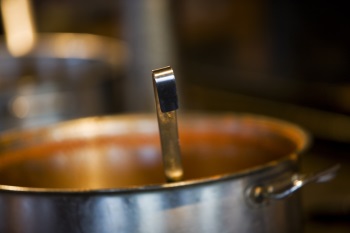Don’t try this at home, kids.
Or do, but only if you’re feeling brave. Commissary Kitchen is one man’s practical, informative guide to all things food and politics in prison. That man—Albert “Prodigy” Johnson of the ‘90s rap duo Mobb Deep—even punctuates some of the cookbook’s recipes with, “Good luck, yo.”
Prodigy collaborated with journalist Kathy Iandoli to compose the survival guide. In it, he dishes out the truth: basic nutrition is a serious struggle for those behind bars.
Maybe we don’t picture prison to be flowing with milk and honey. But when corrections officials can restrict commissary access, vegetables often evade people’s plates, and ramen is currency for gifts and services, it ought to raise some questions.
 Prodigy started searching for answers when he realized his in-prison meals weren’t cutting it. In his lifelong battle with sickle cell anemia, he has kept a close watch on his health. But after he was sentenced in 2007 for illegally possessing a firearm, proper nutrition took a backseat.
Prodigy started searching for answers when he realized his in-prison meals weren’t cutting it. In his lifelong battle with sickle cell anemia, he has kept a close watch on his health. But after he was sentenced in 2007 for illegally possessing a firearm, proper nutrition took a backseat.
In some facilities, prisoners can opt to cook their own meals in the “day room,” or common cooking area. Prodigy tells National Public Radio that desirable supplies are few and far between, but the prisoners do what they can.
“It’s just relaxing and you almost forget where you’re at for an hour or two,” says Prodigy. “It helps people get along, too. Sometimes if you’ve got a group of people in there that are cool with each other, we’d order a chicken [from the commissary] together or make a dinner.”
Sweet potato pie, baked seafood with vegetables, macaroni salad—these are but a taste of the recipe repertoire found in Commissary Kitchen.
In the largely dehumanizing environment of prison, Prodigy believes that being able to prepare good food helps to make the men there feel more human. And while he acknowledges that his cookbook might not make readers better cooks, he suggests that “… it might make you a better person.”
Food. Relationship. Quality time. The simplest things can allow men and women to feel that their lives have value. That is why Prison Fellowship supports a healthier criminal justice system—one that affirms the dignity of people behind bars and restores all those affected by crime and incarceration. By promoting a more constructive prison culture, we can start to see real change on both sides of the razor wire. To learn more, sign up for our advocacy updates here.